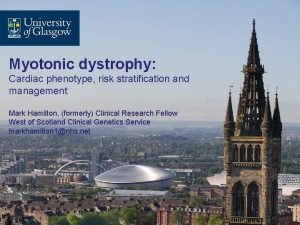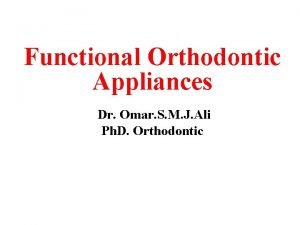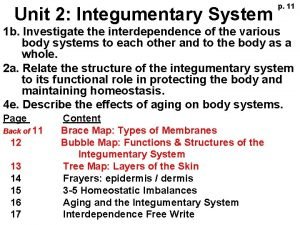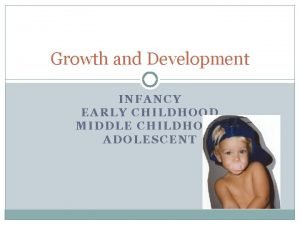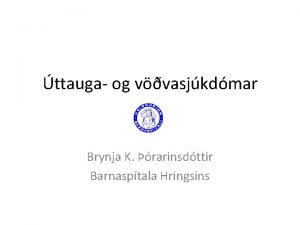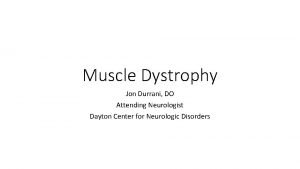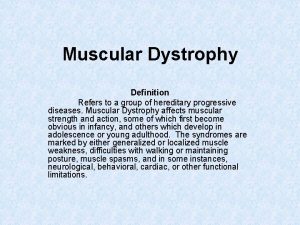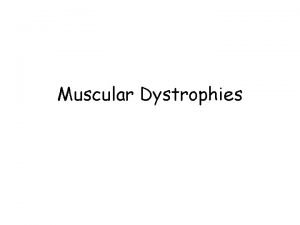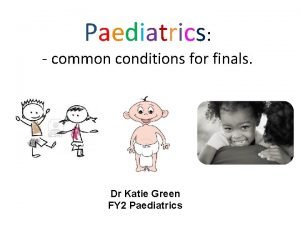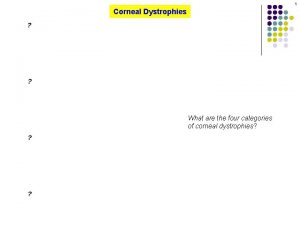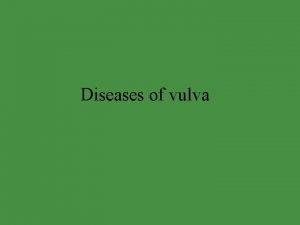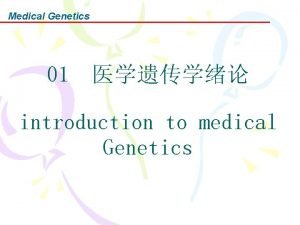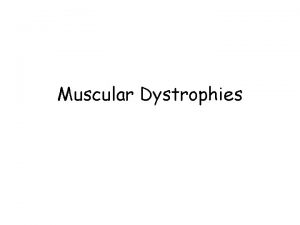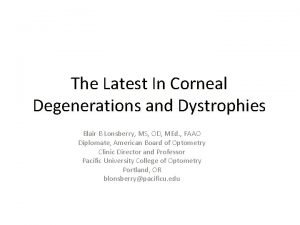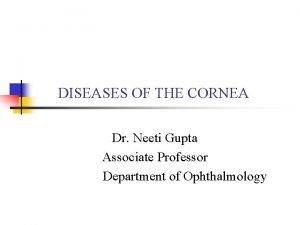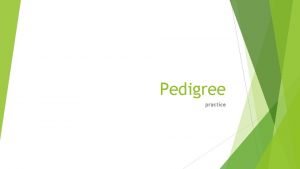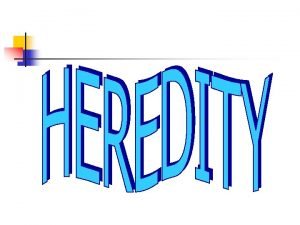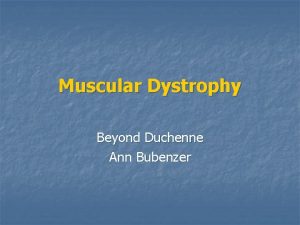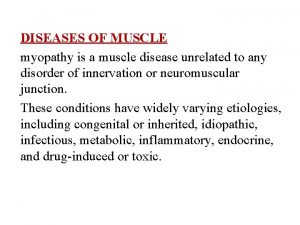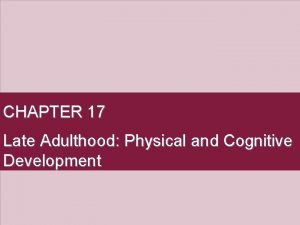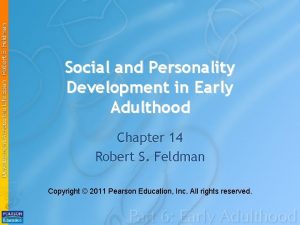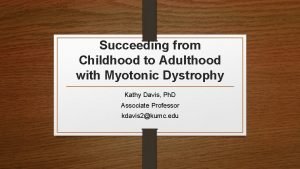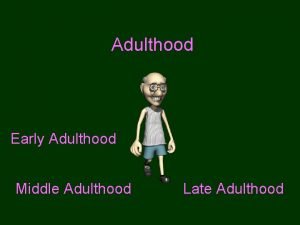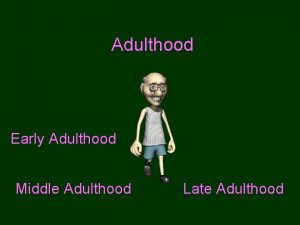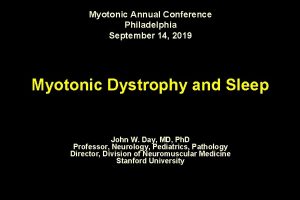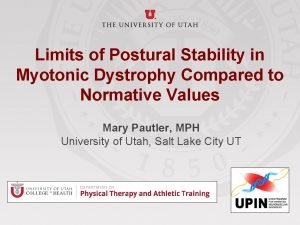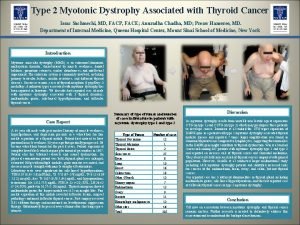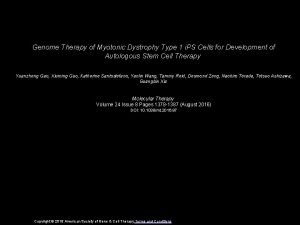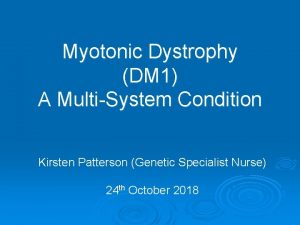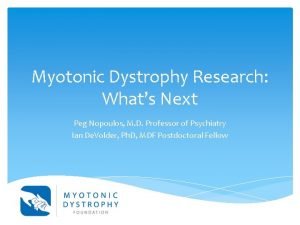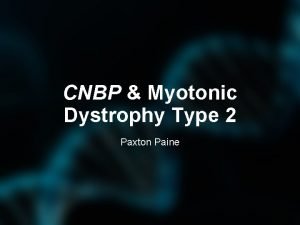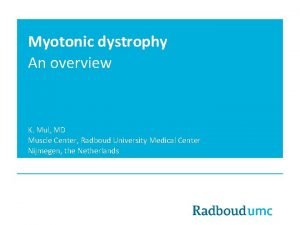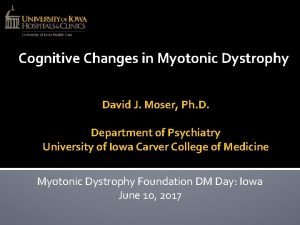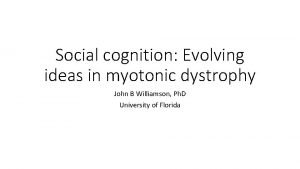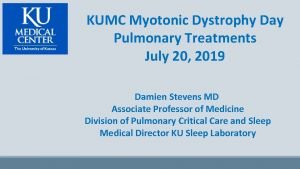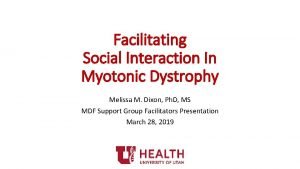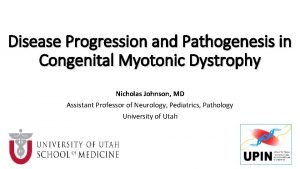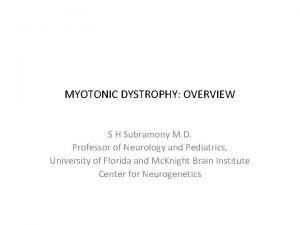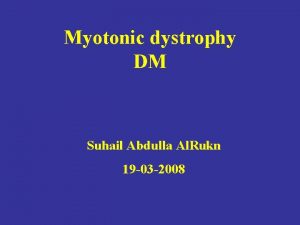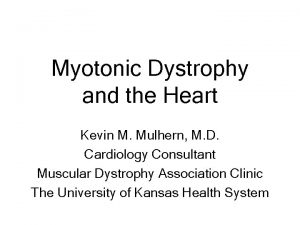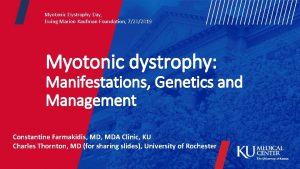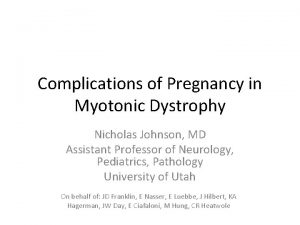Succeeding from Childhood to Adulthood with Myotonic Dystrophy























- Slides: 23

Succeeding from Childhood to Adulthood with Myotonic Dystrophy Kathy Davis, Ph. D Associate Professor kdavis 2@kumc. edu

Key Concepts • Individuals with Disabilities Education Act (IDEA) • Section 504 of the Rehabilitation Act (504 Plans) • Vocational and Rehabilitation Services (Voc Rehab or VR) • Transition: from Pediatric to Adult Medicine

d n I d i iv s l ua t i w D h b a is e i t ili E s c u d n o i t a t c A

Individuals with Disabilities Education Act • ensures students with a disability are provided with Free Appropriate Public Education (FAPE) that is tailored to their individual needs. • Part C – ages birth – 2 (Infant-Toddler Services) • Part B – ages 3 -21 (Early Childhood Special Education and school age)

Individuals with Disabilities Education Act • What it is • IDEA • Qualifying

13 categories - IDEA • • Autism Deaf-blindness Deafness Hearing impairment Emotional disturbance Intellectual disability Multiple disabilities • • Orthopedic impairment Other health impairment Specific learning disability Speech or language impairment • Traumatic brain injury • Visual impairment (including blindness)

y l e s r e v d c a i h m c e i d h a c W a e. c s B t n c a e f m f r a o f r e p

IDEA • Making it work • Individualized Education Program (IEP) • Is it working for you, for your child? • • Special education teacher Principal Director of special education State Department of Education

Sec tion 504 of t he R eha Ac t bili tati on

Section 504 • • Civil Rights legislation (1973) No $ to fund; $ in penalties for not funding Persons cannot be discriminated against on the basis of a disability Disability defined under Section 504: • has a mental or physical impairment, has a record of impairment or is regarded as having such an impairment • Federal government considers students as disabled if they are substantially limited in their major life activities such as (but not limited to) self-care, breathing, walking, seeing, performing schoolwork, speaking and learning.

Section 504 • Provides accommodations, not special education • • • Preferential seating Quiet area for test taking Extra time to complete assignments Rest period in the nurse’s office Special bus transportation Someone to push their wheelchair during marching band

504 and Higher Education • Intention was to impact employment for people with disabilities • First legislation that provided equal access for students with disabilities • • Accessible programs Students who need accommodations must initiate the process May require medical documentation of diagnosis, functioning Must make reasonable accommodations

Vocational and Rehabilitation Services

Voc Rehab (VR) • Vocational Rehabilitation Services (VR) provides quality individualized services to enhance and support people with disabilities to prepare for, obtain or retain employment. • Vocational rehabilitation programs are custom-designed for each individual. • Services: assessment services, counseling and guidance, training (school), job related services, rehabilitation technology (assistive technology), independent living, and a variety of support services. • http: //www. parac. org/svrp. html

Eligibility for VR • If a VR counselor determines that you meet the following three conditions: • You have a physical or mental disability. Determined by medical records or by completing tests, exams, or evaluations to verify the disability. • Your disability prevents you from getting or keeping a job. • You require vocational rehabilitation services to get or keep a job that matches your strengths, resources, priorities, concerns, abilities, capabilities, interests, and choices.

SSI and PASS • Social Security Income - pays monthly benefits to people with low incomes and limited assets who are 65 or > years, are blind, or have other disabilities. • Parents’ assets considered for SSI until the child turns age 18. • Plan for Achieving Self Support (PASS) - student is able to set aside income and resources that are being used toward a specific vocational goal (such as college tuition) and still receive SSI payments. However, be aware that earnings from employment may affect SSI benefits. • http: //www. ssa. gov/disability/

Transition • Should start at diagnosis – always thinking of preparation for adulthood. Courses, interventions and significant life milestones. • Medical transition • From pediatrics to adult provider • Social transition to independent living and full societal inclusion • Involving patient and parents in decision making. Transition to spouse and patient. • Patient advocacty groups

3 -Ps of Transition 1. People (patient) focused • peds and adult team meet with patient/family. • Beyond medical needs – focus on the whole person • Seminars to address college, personal care, dating, etc.

3 - Ps of Transition 2. Process-focused • Tracking systems to inform docs/track progress over time • Identifies when patients are “transition ready” • Ensures important information such as self-advocacy skills, health insurance planning, etc. are part of EMR

3 – Ps of Transition 3. Performance-focused • Transition is more difficult due to challenges including fewer adult providers, insurance complications, etc. the purpose of transitioning patients can get “lost in the shuffle”. • Transition improves patient care and quality of life (Qo. L) so it is important to do it right. • Providers much work hard to ensure patients’ needs and Qo. L are addressed (sexual health, dating, independent living, etc. ).

Palliative Care • It is NOT your grandma’s palliative care!~ • Different focus with young people • Quality of life • Enhancing opportunities • Development across all spheres: social, emotional, cognitive, comfort with friends, etc. • Enabling the young person to “be all that they can be”

Resources • • https: //www. mda. org/young-adults/resources http: //quest. mda. org/news/thinking-college-think-scholarships http: //www. myotonic. org/sites/default/files/Financial%20 Resources %20 for%20 Families%20 with%20 DMPDF_1. pdf • https: //www. scholarships. com/financial-aid/college- scholarships/scholarships-by-type/disability-scholarships/

Please contact me or come to MDA clinic (on a day I am there!) Kathy Davis, Ph. D Associate Professor of Pediatrics Director, KU Kids Healing Place 3901 Rainbow Blvd. MS 4004 Kansas City, KS. 66160 kdavis 2@kumc. edu 913 – 588 – 6305
 Myotonic dystrophy
Myotonic dystrophy Philosophy of frankel appliance
Philosophy of frankel appliance Infancy childhood adolescence adulthood old age
Infancy childhood adolescence adulthood old age Middle childhood
Middle childhood Limb girdle muscular dystrophy
Limb girdle muscular dystrophy Jon durrani
Jon durrani Muscular dystrophy definition
Muscular dystrophy definition Duchenne
Duchenne Dr katie green
Dr katie green What is dystophin
What is dystophin Marilyn monroe always gets her man in la county
Marilyn monroe always gets her man in la county Kayser fleischer ring keratoconus
Kayser fleischer ring keratoconus Vulvar dystrophy thyroid
Vulvar dystrophy thyroid Genetics
Genetics Duchenne muscular dystrophy pedigree
Duchenne muscular dystrophy pedigree Mooren ulcer
Mooren ulcer Signs of duchenne muscular dystrophy
Signs of duchenne muscular dystrophy Salzmann's nodular dystrophy
Salzmann's nodular dystrophy The pedigree below tracks the presence of attached earlobes
The pedigree below tracks the presence of attached earlobes Duchenne muscular dystrophy
Duchenne muscular dystrophy Duchenne muscular dystrophy
Duchenne muscular dystrophy Becker muscular dystrophy
Becker muscular dystrophy Physical changes in late adulthood
Physical changes in late adulthood Personality development in early adulthood
Personality development in early adulthood
